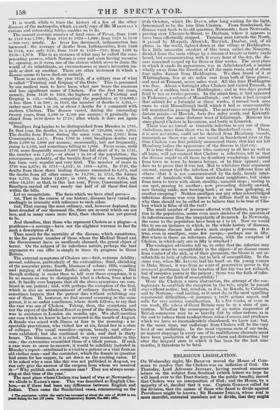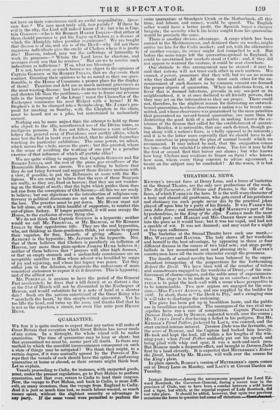RELIGIOUS LEGISLATION.
ON Wednesday night, Mr. BRISCOE moved the House of Com- mons to resolve that the Cholera was an infliction of God. On Thursday, Lord Advocate JEFFREY, having received numerous letters on the subject from Scotland (which letters we hope he will hand over to the Tract Society, for the public benefit), moved that Cholera was an interposition of God; and the House, by a majority of 45, decided that it was. Captain GORDON called for the division, that the names of those who dared to divide against Providence might be known; Sir ROBRRT Nous, whose zeal is more merciful, entreated members not to divide, that they might not have on their consciences such an awful respongibility. Quor- sum hcec? We may most truly add, tam putida? If there be evil in the city, the Lord will indeed know of it; but who is Cap- tain Gonnox—who is Sir ROBERT HARRY INGLIS—that either of them should presume to put his finger on Cholera as a disease of which the Almighty takes peculiar cognizance? We are taught that disease is of sin, and sin is of the Devil—why did not these sagacious individuals give the credit of Cholera where it is justly due? Heaven, indeed, may use the sufferings of humanity to work its purposes—" Whom the Lord loves he chastens, and scourges every son that he receives." But are we to receive such indications as inflictions? If so, what are blessings?
It is not, however, so much because we object to the opinions of Captain GORDON or Sir ROBERT INGLIS, that we deprecate their conduct. Granting their opinions to be as sound as they are ques- tionable, is the House of Commons a proper place for the display of them? Taxation and debt are as much national grievances as the most wasting disease; bad laws do more to interrupt happiness and shorten life than the pestilence,—are we to frame our revenue bills in the language of the Litany? must the Chancellor of the Exchequer commence his next Budget with a hymn? If St. Stephen's is to be changed into a Scruple-shop, Mr. J_AMES'S pro- posal for meeting on Sunday, with the Chaplain in the chair, must be heard not as a joke, but entertained in melancholy earnest.
Nothing can be more unjust than the attempt to hold up those who object to the idle, unauthorized use of the Divine name, as irreligious persons. It does not follow, because a man acknow- ledges the general sway of Providence over earthly affitirs, which none but the fool in heart ever doubted, that he should dogmatize touching its particular exhibitions. The same power, we admit, which moves the whole, moves the parts; but this granted, where is the sense of ascribing the working of one part to a peculiar exercise of that influence of which all partake alike?
We are quite willing to suppose that Captain GORDON and Sir ROBERT INGLIS, and the rest of the pious par excellence of the Honourable House, are sincere. We are willing to believe that they do not bring forward and support these divisive motions with a view, if possible, to put the Reformers at issue with the Re- ligious. We are ready to believe that the eyes of these Sanyasis are really, as they say, fixed on heaven; that they are not wander- ing on the things of earth; that the light which guides them does not rise from the corruptions of Old Sarum ;—all this we are ready to believe; but our objections to the introduction of religious con- troversy in political discussions are not on that account one whit the less. The practice must be put down. Mr. HUME must not be left alone, or with a little handful of supporters, to combat this out-of-place foolery. If longer permitted, it will soon occupy the House, to the exclusion of every thing else. We do not think that Captain GORDON is a hypocrite; neither would we call Mr. PEricEvAL, or Mr. BRISCOE, or Sir ROBERT INGLIS by that opprobrious title. They are the real hypocrites, who, not thinking as these gentlemen think, yet scruple to oppose their vagaries, for fear, forsooth, of giving offence. Lord ALTHORP is the hypocrite ; Mr. JEFFREY is the hypocrite. Nei- ther of them believes that Cholera is peculiarly an infliction of Heaven, *any more than plain-spoken JOSEPH HUME believes it; neither of them believes that "prayers will alter high decrees," or that an empty stomach and a melancholy countenance are an acceptable sacrifice to Him whose advent was heralded by songs of joy and rejoicing, and whose last legacy was peace. Yet they either join in the delusion, or deprecate the endeavours of more consistent statesmen to expose it as it deserves. This is hypocrisy, and of the silliest sort.
Mr. FERCEVAL is anxious to have the period of the General Fast accelerated; he fears that a bill drawn at so distant a day as the 21st of March will not be discounted in the Exchequer of Heaven, and would substitute for it a note of hand at a shorter date ! Such are the notions entertained of the Great Being who " searcheth the heart," by this simple-witted sinecurist. Yet he too lifts the head, and turns up the nose, and thanks God that he is not as the reporters, a sinner, nor even like unto poor HENRY HUNT.



























 Previous page
Previous page